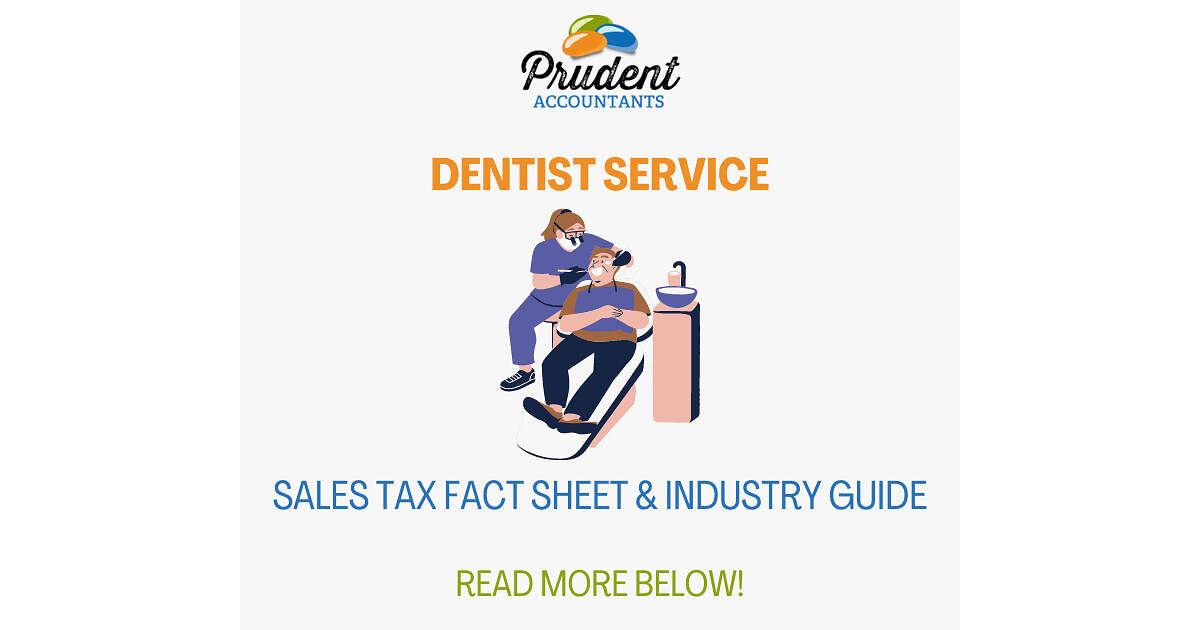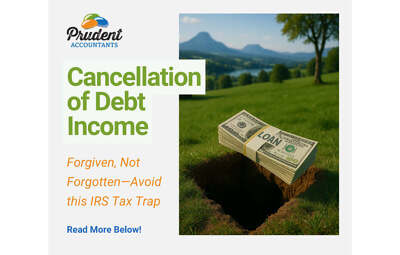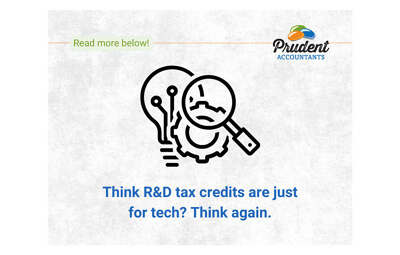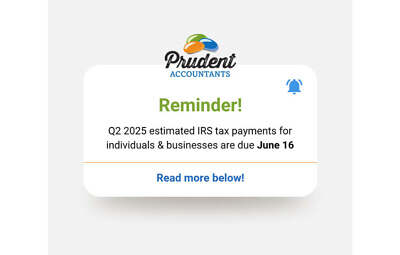Dentist Service – Sales Tax Fact Sheet & Industry Guide

Sales
Dental treatment, diagnostic, and preventive care services are not taxable. This includes services performed by licensed dentists engaged in general or specialized dentistry, orthodontists, dental surgeons, and other licensed practitioners. However, those in the dental industry may make some taxable sales.
Note: While sales tax may not apply, gross revenues for dental services are subject to MinnesotaCare taxes.
Sales of certain items sold by a dentist are taxable.
Examples include:
- Athletic sports mouth guards
- Mouthwash and toothpaste, unless product is only available through a prescription written by a health care professional, then the product is exempt as the sale of a drug
- Toothbrushes (manual and powered)
- Tooth bleaching agents and trays (including whitening strips) for the patient to use at home
Note: Tooth whitening services performed in the clinic are not taxable sales.
Sales of the following items are not taxable:
- Prescribed and over-the counter drugs for human use
- Prosthetic devices, including repair and replacement parts
- Disposable or single patient use items used with prosthetic device
- Accessories and supplies for the effective use of a prosthetic device
Sales and purchases of prescription and over-the-counter drugs for human use are exempt from sales tax. Examples include:
- Antibiotics
- Anesthetics, local and topical
- Medical grade oxygen
- Pain and sedation medicines
For more information, see Drugs.
Over-the-counter drug means a drug that contains a label that identifies the product as a drug as required by Federal Regulations. For more information, see Grooming and Hygiene Products.
Vitamins and minerals are not included in the definition of over-the-counter drugs. They are taxable as dietary supplements. For more information, see Dietary Supplements.
Sales and purchases of prosthetic devices are exempt from sales tax. A prosthetic device means a replacement, corrective, or supportive device, including repair and replacement parts, worn on or in the body to:
- Artificially replace a missing portion of the body
- Prevent or correct physical deformity or malfunction
- Support a weak or deformed portion of the body
Examples include:
- Braces
- Crowns, bridges, and other implants
- Dentures or artificial teeth
This exemption includes disposable or single patient use items used in conjunction with prosthetic devices. Before July 1, 2013, the disposable and single use items were taxable.
For more information, see Prosthetic Devices.
Charges for copies of medical records are taxable, including any retrieval or scanning fees. This includes copies to the patient or insurance companies.
Records transferred electronically are not taxable, unless they include audio or audiovisual products. For more information, see Revenue Notice 98-23, Application of Tax to Copies and Digital Products.
If you sell or lease equipment or other items that you used in your business, the sale may be taxable. For more information, see Isolated and Occasional Sales.
Some cities and counties have local sales and use taxes. If you are located in or make sales into an area with a local tax, you may owe local sales and use tax. For more information, see Local Sales and Use Taxes.
To determine the sales tax rate, use the location where the product is received by the customer, typically your business or a delivery address. You can use our Sales Tax Rate Map or Sales Tax Rate Calculator to help you determine the sales tax rate.
Note: The map and rate calculator do not include special local taxes.
For more information, see:
Critical Access Dental Provider
You are allowed an exemption from sales tax on certain purchases if you meet the following requirements:
- You’re a critical access dental provider approved as a charitable organization
- No more than 15% of your patients are covered by private dental insurance
Sales are treated the same as other dentist’s sales.
Purchases to provide services you are authorized or required to provide by law, including administrative functions, are nontaxable. To claim the exemption, provide the seller with a completed Form ST3, Certificate of Exemption.
All other purchases are taxable. Examples of taxable purchases include:
- Lawn and garden maintenance
- Lodging
- Paintings and other décor
- Public computers
- Purchases or leases of motor vehicles
- Purchases of prepared food, soft drinks, candy, and dietary supplements
- Vending machines
Taxable Purchases and Use Tax
Items you use to operate your business are taxable unless an exemption applies. Several services are also taxable.
If you do not pay sales tax on a taxable purchase, then use tax is due.
The following purchases are subject to sales or use tax.
TAXABLE PURCHASES |
EXAMPLES |
|
|
|
|
|
|
|
|
|
|
|
|
If you buy equipment, supplies, or other taxable items for your business and the seller does not charge Minnesota sales tax, you owe use tax on the cost of the items. If your business is located in an area with a local tax, you may also owe local use tax.
Some common situations where you may owe use tax include:
- You buy taxable items or services online without paying sales tax
- You withdraw an item from inventory to use (instead of selling it), donate, or give away
- You buy taxable items outside of Minnesota
- You buy taxable items in another Minnesota city or county with a lower (or no) local sales tax
For more information, see Use Tax for Businesses and Local Sales and Use Taxes.
Taxable Dental Items
For more information, see Taxable Purchases and Use Tax.
- Cleaning supplies and chemicals
- Communication devices
- Composite tips
- Copies of medical records
- Cups for dispensing medications
- Dental health educational products
- Dental models
- Dental products given to the patient to take home (oral hygiene products, dental floss, mouthwash, toothbrushes, toothpaste)
- Dental tools and equipment
- Digital X-ray equipment, sensors, and disposable sensor sheaths
- Disinfecting fluid and surface sanitizers
- Disposable equipment and tools, including single use prophy angles and disposable mirrors
- Disposable sanitary and protective items (shields and bibs, sleeve covers, head covers)
- Face masks
- Filter masks
- First-aid products and kits
- Gifts and promotional items
- Impression materials and trays
- Laboratory equipment, supplies, and reagents
- Medical forms and records (including retrieval fee)
- Medication dispenser
- Needles and syringes used for testing or diagnosis, such as drawing blood
- Oxygen tanks (for non-medical use)
- Pouches (purchased by the dentist in transporting plaster impressions to dental labs)
- Radiological supplies
- Tongue depressors
- Tooth polishing cups and brushes
- Trays
- Whitening products given to patients to take home
- X-ray equipment and film (bite wing pressure tabs)
Nontaxable Purchases
The following purchases are not taxable when purchased by a dentist.
Purchases of medical supplies are exempt from tax when:
- Purchased by a licensed dentist or health care professional
- Used directed on a patient as part of treatment
To claim this exemption, you must give your vendor a completed Form ST3, Certificate of Exemption. Specify the Medical supplies for a health-care facility exemption.
For a list of dental items that qualify for this exemption, see Exempt Dental Items.
The medical supplies exemption does not include:
- Durable medical equipment, including repair and replacement parts
- Disposable or single use medical equipment and surgical instruments
Materials and items that remain in the patient’s mouth are not taxable. Examples include:
- Composite restoratives
- Silver amalgam
- Sealants
- Accounting and legal services
- Clothing for general wear, including scrubs, lab coats, and gloves (latex, nitrile, cloth)
- Magazine subscriptions and newspapers (single issue magazine purchases are taxable)
Exempt Dental Items
The following is a list of items that are not taxable when purchased and used by a licensed dentist or other health care professional.
For more information, see Nontaxable Purchases.
- Gloves (nitrile, latex, cloth)
- Lab coats
- Scrubs
- Points (gutta percha, paper, silver)
- Root canal sealer
- Antiseptics
- Cotton applicators
- Dental oral hygiene products (dental floss, mouthwash, prophy paste)
- Disposable needles and syringes when used to treat a patient such as giving an anesthetic
- Gauze pads and strips
- Nonprescription drugs
- Acrylic retainers
- Bands (elastic, metal)
- Brackets
- Buttons
- Cleats
- Face bows
- Hooks
- Positioners
- Space maintainers
- Springs
- Tubes
- Antibiotics
- Fluoride (prescription dose)
- General anesthetic drugs, gases
- Local anesthetics
- Medical grade oxygen
- Nitrous oxide
- Pain medication
- Sedation drugs
- Tooth bleaching agents
- Topical anesthetics
- Acrylic, including tints
- Artificial teeth
- Clasp and bar wire
- Complete dentures
- Crowns and bridges (gold, porcelain, stainless steel, resin, aluminum)
- Denture reline materials
- Occlusal mouth guards
- Partial denture
- Porcelain
- Adhesives
- Cavity lining varnishes
- Cements
- Composite restoratives
- Endondontic posts
- Gold
- Glass monomer cements and restoratives
- Mercury
- Metal retention posts
- Pit and fissure sealant
- Silver amalgam
- Bone materials
- Bone plate systems
- Hemostatic pack agents
- Implants
Filing Returns and Record-Keeping
When filing your return, you must report all sales tax collected and use tax you owe.
If you are not registered for sales and use tax, you must contact the Minnesota Department of Revenue and register to collect and report taxes. Call Business Registration at 651-282-5225 or 1-800-657-3605 (toll-free).
For more information, see Sales Tax Return Due Dates.
You must file a Sales and Use Tax return online through our e-Services system. For more information, see Filing Information.
It is important to keep good records to determine the correct amount of state and local tax you owe.
Your records should include:
- bills, receipts, invoices, cash-register tapes, and any other documents that support the entries in your books
- exemption certificates
- shipping documents
- worksheets used to prepare your tax returns
For more information, see the Dentist Service – Sales Tax Fact Sheet & Industry Guide








